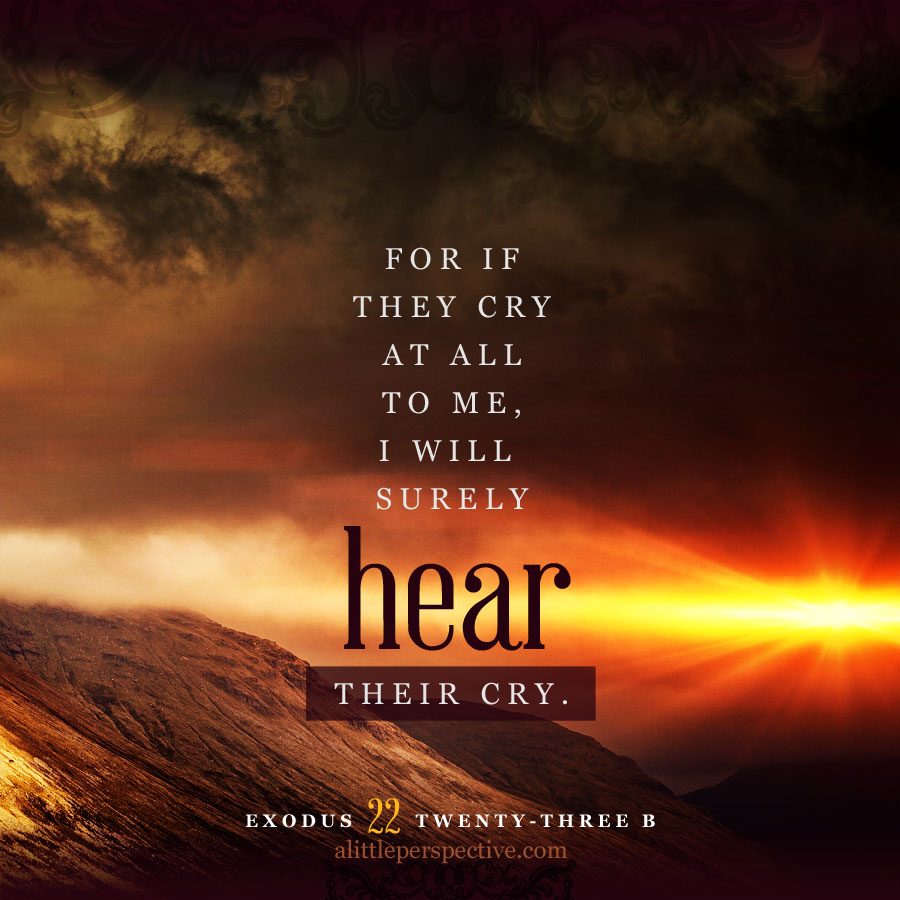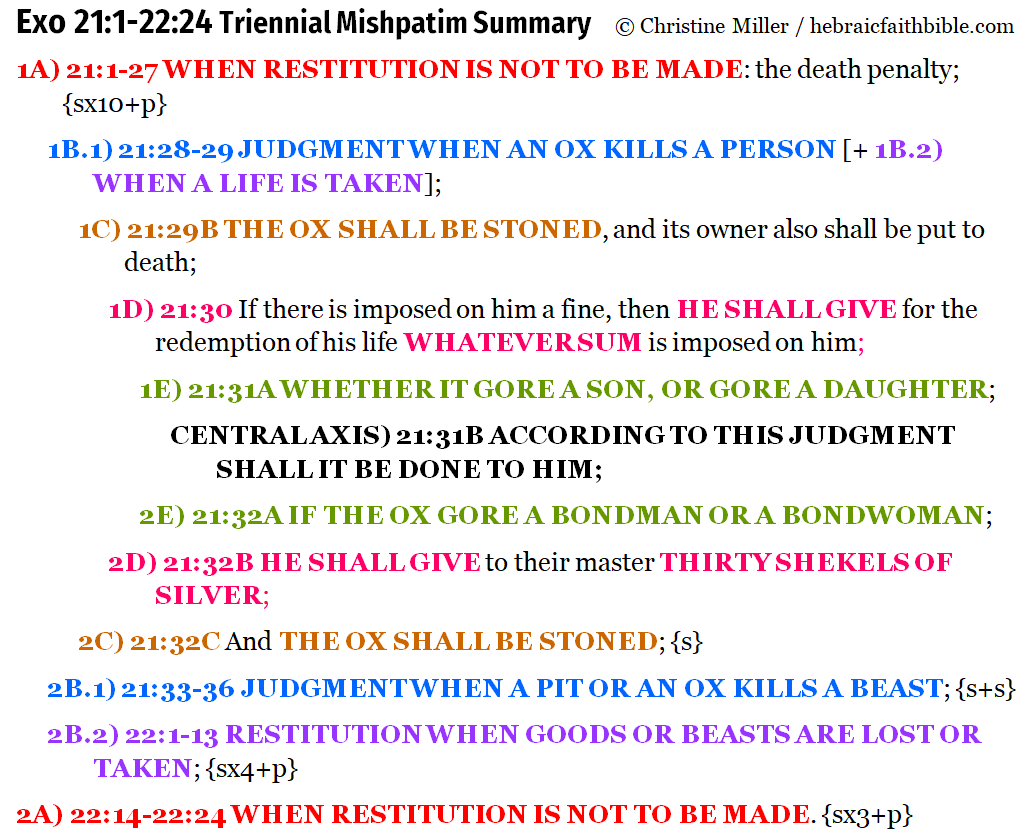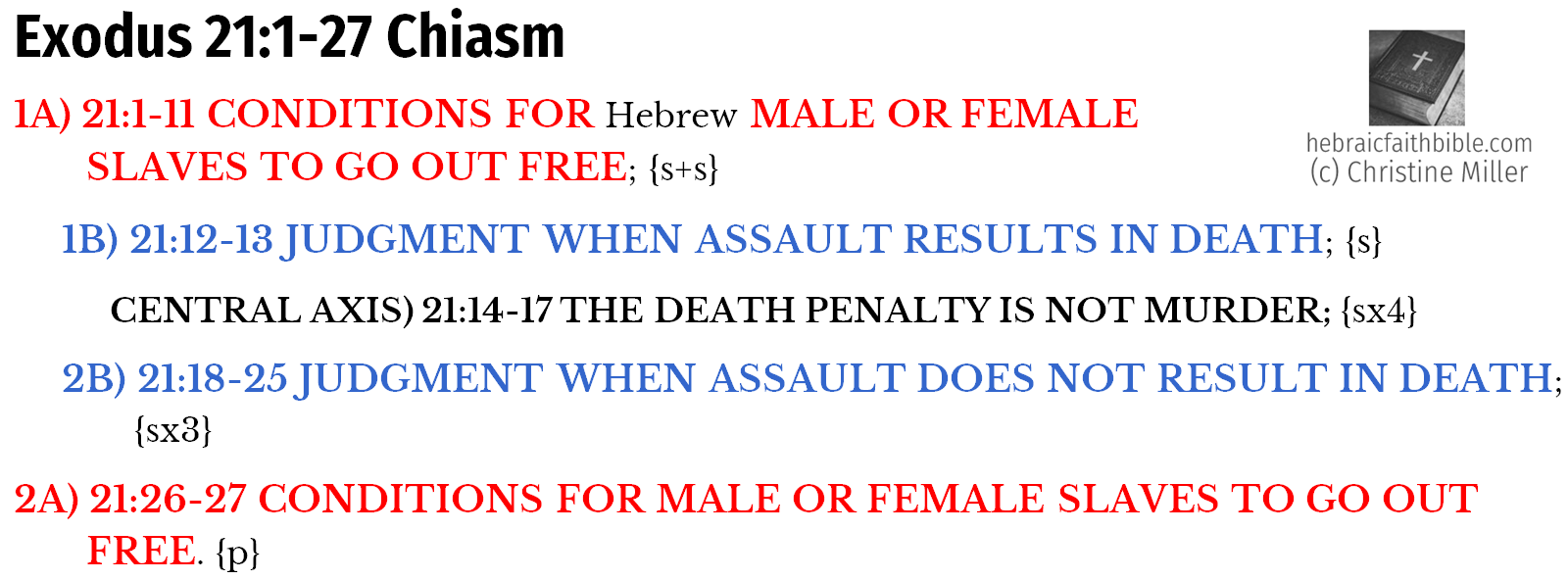Read Exodus 21:1-22:24 at Bible Gateway.
The teaching tools of scripture
Gen 1:1-2:3 and the teaching tools of scripture part one and part two
Gen 1:1-6:8 and finding the topic themes of scripture
Hebrew paragraph divisions
21:1-6 {s} Conditions for a Hebrew male slave to go out free
21:7-11 {s} Conditions for a Hebrew female slave to go out free
21:12-13 {s} Manslaughter is not murder
21:14 {s} Murder receives the death penalty
21:15 {s} Striking father or mother receives the death penalty
21:16 {s} Kidnapping receives the death penalty
21:17 {s} Cursing father or mother receives the death penalty
21:18-19 {s} Assault of a neighbor when he does not die
21:20-21 {s} Assault of a male or female slave when he does or does not die
21:22-25 {s} Assault of a woman with child when the child does or does not die
21:26-27 {p} Conditions for male or female slaves to go out free
21:28-32 {s} Restitution when an ox gores a person to death
21:33-34 {s} Restitution when a pit causes the death of an animal
21:35-36 {s} Restitution when an ox causes the death of an animal
22:1-4 {s} Restitution when a theft is discovered
22:5 {s} Restitution when an animal feeds in another man’s field
22:6 {s} Restitution when fire destroys a harvest
22:7-9 {s} Restitution when goods are lost from a neighbor’s safe- keeping
22:10-13 {p} Restitution when goods are destroyed from a neighbor’s safe- keeping
22:14-15 {s} Restitution when goods are borrowed
22:16-17 {s} Restitution when a virgin is seduced
22:18-19 {s} Sorceress = death penalty + lying with animals = death penalty
22:20-24 {p} Idolaters + afflicters of strangers, widows, orphans = utterly destroyed
Strong themes of the parashah
21:1-27 {sx10+p} Restitution in cases of slavery, or when a person causes injury or death (‘You shall not commit murder’)
21:28-22:13 {sx7+p} Restitution when a thing causes injury, death, or loss of property (‘You shall not steal’)
22:14-22:24 {sx3+p} When restitution is not to be made (‘You shall not commit adultery’)
Exo 21:1-22:24 Chiastic structure
Download the fully expanded Exo 21:1-22:24 triennial Mishpatim chiasm pdf.
Theme of the parashah
Do not murder, steal, and commit adultery explanation: when restitution is and is not to be made
Finding Messiah in Triennial Mishpatim
The first strong theme of Mishpatim is from Exo 21:1-27 {sx10+p}, Restitution in cases of slavery, or when a person causes injury or death (‘you shall not commit murder’). Its structure:
While the majority of the strong theme has to do with what constitutes murder, it opens and closes with conditions in which a slave goes free. But why include something that does not have to do with death, within a strong theme which has to do with death?
It is because slavery is a Torah metaphor for death. When Joseph was sold into slavery in Egypt, he was a type of Messiah going to his death, only to be raised up to life again, providing life for everyone else through it. This strong theme which explains murder, and imposes death, is “swallowed up” by its opening and closing paragraphs of slaves going out free. Death swallowed up in life, which only comes through the Victor who defeated death, Yeshua.
Additional readings for this parashah
Psa 55 (my notes) | Isa 56 (my notes) | Mat 5 (my notes)
Studies in triennial Mishpatim
Exodus 21, Bible for Beginners
Exodus 22, Bible for Beginners
Exodus 21:1-27, Death swallowed up in life
Exodus 21:1-6, Hebrew roots
Exodus 21:1-11, Chiastic structure
Exodus 21:12-13, Murder defined
Exodus 21:14-17, Chiastic structures
Exodus 21:18-25, Chiastic structure
Exodus 21:28-22:13, Strong theme
Exodus 22:12-23:33, Chiastic structure
Exodus 22:14-24, Hebrew roots
Exodus 22:14-24, Chiastic structure
SCRIPTURE REVEALED SERIES by CHRISTINE MILLER:
THE LAW of LOVE | FINDING MESSIAH in TORAH | EXODUS in CHIASTIC STRUCTURE



















Leave a Reply